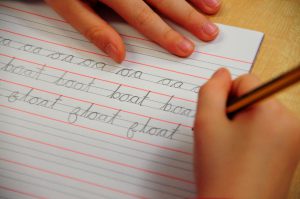
At St Philip’s we develop independent, confident, accurate and inspirational writers as part of our English teaching. It is essential that writing knowledge, skills and understanding are then applied across the whole curriculum in order to embed learning. We always aim to provide a purpose for writing and make writing engaging for all children. Children are encouraged to not only write to the best of their ability but to also independently improve and edit their own and other’s work.
We use a range of stimuli to engage children in the writing process including the use of visual images and film, literature, drama, music, practical resources, and educational trips and special days. Children are taught how to structure their sentences grammatically through speaking and listening, and to use ambitious vocabulary, in order to ensure the most impact upon the reader; they are given the opportunity to apply their skills in weekly extended writing tasks in both English and across the curriculum.
The programmes of study for writing at key stages 1 and 2 are :
- transcription (spelling and handwriting)
- composition (articulating ideas and structuring them in speech and writing)
In school, we use the Literacy Tree scheme of work to ensure progression throughout the school.
Teaching and learning develops pupils’ competence in both of these areas. In addition, pupils are taught how to plan, revise and evaluate their writing.
Writing down ideas fluently depends on spelling quickly and accurately through knowing the relationship between sounds and letters (phonics) and understanding the morphology (word structure) and orthography (spelling structure) of words.
Effective composition involves articulating and communicating ideas, and then organising them coherently for a reader. This requires clarity, awareness of the audience, purpose and context, and an increasingly wide knowledge of vocabulary and grammar.
Handwriting is an important part of the curriculum, children are taught the early stages of joining their writing in year 1 and children are expected to join their handwriting from year 2. We use a cursive script to enable children’s writing to flow.
Progression in Grammar, Writing, Spelling & Reading Y1 – Y6
Oracy
Oracy has been built into all areas of the curriculum so that the children are learning to talk and learning through talk. The Voice 21 Oracy Framework has been introduced across the school so that children are taught about oracy through the four strands: physical, linguistic, cognitive, social & emotional. A range of opportunities to talk is employed through both exploratory and presentational talk across all areas of the curriculum. Children are active learners and have developed discussion guidelines which are used in lessons to ensure that all children participate effectively, both as good speakers and listeners. Time is given for oral rehearsal so that new vocabulary and grammatical features can be practised and understood fully before being applied to writing.
The Literacy Tree Scheme of Work
The award-winning Literary Tree is a complete, book-based approach with a consistent, cohesive pedagogy used across a school. The scheme of work immerses children in a literary world, creating strong levels of engagement to provide meaningful and authentic contexts for learning.
All plans follow a ‘Teach Through a Text’ pedagogy to ensure engagement, coverage and outcomes and follow a cohesive sequence so that learning makes sense and is rooted in a strong context. Depth is engendered as children revisit key objectives and skills within different texts and contexts, building understanding over time with frequent opportunities to apply their learning across varied writing opportunities. Books are grouped within themes to ensure links and connections are made within and across the Programme of Study.
Children become critical readers and acquire an authorial style as they encounter a wide-range of significant authors and a variety of fiction, non-fiction and poetry.
Writing Milestones & Curriculum EYFS
Spelling, vocabulary, grammar and punctuation
We follow a carefully planned spelling curriculum, beginning with phonics in the infants and progressing to a spelling scheme of work, based upon the National Curriculum in the juniors, using the Spelling Seeds scheme of work which works alongside The Literacy Tree English scheme of work. Children learn the rules and exceptions of the English language ensuring that accurate spelling is applied across the curriculum.
Opportunities for teachers to enhance pupils’ vocabulary arise naturally from their reading and writing. ‘Word of the Day’ is also taught in key stage 2, introducing the children to new, adventurous words to apply in their speaking, then their writing. As their vocabulary increases, teachers show pupils how to understand the relationships between words, how to understand nuances in meaning, and how to develop their understanding of, and ability to use, figurative language. They also teach pupils how to work out and clarify the meanings of unknown words and words with more than one meaning.
As part of grammar teaching and learning, pupils are taught to control their speaking and writing consciously and to use Standard English where appropriate. Pupils work hard to learn the correct grammatical terms in English and to understand and use these within their writing.

